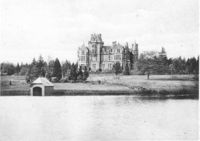Annotation:Miss Graham of Orchill’s Reel: Difference between revisions
(Created page with "'''Back to [[{{BASEPAGENAME}}]]''' ---- <p><font face="garamond, serif" size="4"> '''MISS GRAHAM OF ORCHILL’S REEL.''' Scottish, Reel. G Major. Standard tuning (fiddle). AA...") |
No edit summary |
||
| Line 2: | Line 2: | ||
---- | ---- | ||
<p><font face="garamond, serif" size="4"> | <p><font face="garamond, serif" size="4"> | ||
'''MISS GRAHAM OF ORCHILL’S REEL.''' Scottish, Reel. G Major. Standard tuning (fiddle). AAB. The melody appears in [[Biography:Malcolm MacDonald]]’s '''Second Collection''', dedicated to the Earl of Breadalbane. | '''MISS GRAHAM OF ORCHILL’S REEL.''' Scottish, Reel. G Major. Standard tuning (fiddle). AAB. The melody appears in [[Biography:Malcolm MacDonald]]’s '''Second Collection''', dedicated to the Earl of Breadalbane. Orchill is in Perthshire, Scotland, site of the estate of the Graham family, a cadet branch of the family of the Dukes of Montrose. | ||
[[File:orchill.jpg|200px|thumb|left|Orchill House]] | |||
The original house in Orchill was built in the early 18th century and is a traditional harled laird’s house with a Gothic tower and great hall. It is said that Mr. Graham of Orchill, also a fiddler, would visit Gow in nearby Dunkeld and stay up whole nights with him playing reels. On one occasion Niel exclaimed: “Troth, Orchill, you play weel;--be thankfu’, if the French should overturn our country, you and I can win our bread, which is mair than mony o’ the great folk can say.” | |||
<br> | |||
<br> | |||
Miss Graham is presumably Margaret Anne Graham, daughter and heiress of William Graham of Orchill. A romantic story has it that Margaret became smitten with a young man named James Gillespie, a craftsman who had been engaged to work on the mansion-house at Orchill. Despite the fact that he had been born to poor parents and was of a much different social class, their love grew and she determined to make him her own. In due time, Margaret inherited and married James, who took the name James Gillespie-Graham of Orchill. James eventually became one of the notable Scottish architects of his age. | |||
<br> | <br> | ||
<br> | <br> | ||
Revision as of 01:47, 4 January 2013
Back to Miss Graham of Orchill’s Reel
MISS GRAHAM OF ORCHILL’S REEL. Scottish, Reel. G Major. Standard tuning (fiddle). AAB. The melody appears in Biography:Malcolm MacDonald’s Second Collection, dedicated to the Earl of Breadalbane. Orchill is in Perthshire, Scotland, site of the estate of the Graham family, a cadet branch of the family of the Dukes of Montrose.

The original house in Orchill was built in the early 18th century and is a traditional harled laird’s house with a Gothic tower and great hall. It is said that Mr. Graham of Orchill, also a fiddler, would visit Gow in nearby Dunkeld and stay up whole nights with him playing reels. On one occasion Niel exclaimed: “Troth, Orchill, you play weel;--be thankfu’, if the French should overturn our country, you and I can win our bread, which is mair than mony o’ the great folk can say.”
Miss Graham is presumably Margaret Anne Graham, daughter and heiress of William Graham of Orchill. A romantic story has it that Margaret became smitten with a young man named James Gillespie, a craftsman who had been engaged to work on the mansion-house at Orchill. Despite the fact that he had been born to poor parents and was of a much different social class, their love grew and she determined to make him her own. In due time, Margaret inherited and married James, who took the name James Gillespie-Graham of Orchill. James eventually became one of the notable Scottish architects of his age.
Source for notated version:
Printed sources: MacDonald (A Second Collection of Strathspey Reels), 1789; p. 6.
Recorded sources:
Back to Miss Graham of Orchill’s Reel
